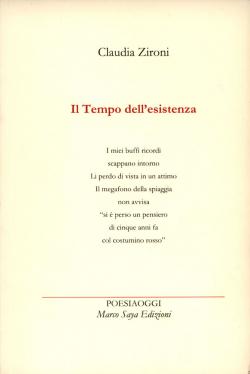Editorial
by Francesca Del Moro
Choose me among your kings
a vortex will wrap us up
I will take you, if you want me
we danced together,
she is gone and now I
have my memories locked inside you
the sadness inside myself
in two hands, that are mine
When it deals with love, the word ‘abandon’ wavers between a multitude of meanings: the positive pole of giving in to feelings and passion, and the negative one, of breaking up and/or surrendering to pain. In Bluvertigo’s song, the two meanings flow into each other, blurring their borders: the sadness and the memories aroused by a farewell result in the will to be completely absorbed by a new relationship. If read in a given sequence, the four selected poems seem to mark the linear evolution of the meaning of the word ‘abandon’ through the development of a love story. Shooting in a low angle view, Miriam Bruni captures the memory of the moment that unleashes passion, when abandon means to fly up in the sky, to be completely exposed to light. In the poem by Sonia Lambertini, sexual intercourse works as a hold against the risk of falling into an abyss that appears ambivalent: it could coincide with the abandon of feelings, i.e. the incapability of feeling, or the abandon to feelings, which makes us precipitate in an insane passion. Silvia Secco light-heartedly accepts the end of a story: she ironically acknowledges the inconsistency of what she has lost and says it goodbye with an almost magical, fairy-tale gesture. A very powerful image of dissolution is painted by Silvia Rosa: in the cup of bitter coffee that she holds in her hands her face seems to liquefy like one of Dalí’s clocks, perfectly materializing the abandon to pain which is the consequence of being abandoned.
It was so very high
di Miriam Bruni
It was so very high
that nothing could
shade it no more
Naked chest in full sun
she didn’t expect it,
you pierced her heart
My eyes are dripping
by Silvia Rosa
My eyes are dripping
in this cup of bitter coffee,
the eyes with all the words
that say eyes and cup and bitter coffee,
with both hands
holding the cup and brushing the lips
and seeing in the liquid blackness of this dawn
the eyes float like two dead fishes
in a puddle of dirty water,
and the mouth hanging from the edge of the cup
leans forward towards the void and swallows blackness
dawn hands and eyes, and when it swallows
the eyes, it falls silent.
I believe in flesh
by Sonia Lambertini
I believe in flesh
and the meeting, of bones
at the friction
sharp noise
at the chemical bond
The abyss exists
and there we lean forward
clinging, partly to the ground
where we make love,
partly to the buttocks
to the breasts
cause the main thing is to feel.
Goodbye to nothing
by Silvia Secco
In the void of absence
I gaze on a nothing in my hands:
your abandoned nothing-at-all
at the starting point.
Never mind. I separate my palms.
I let it fall.
I breathe in and blow:
there’s nothing left.
Il tempo dell’esistenza
by Francesca Del Moro
“The moon pours evil looks
on the last drunkard
tenderly
romantically
embracing a street lamp
with a knife in his stomach”
Claudia Zironi clings to “the time of existence” with her poems that seem to waver like flags constantly at risk of being snatched by the wind, which is “driver and sculptor” of clouds. Tenderly celebrated especially in the wonderful haikus, the clouds look over the Irish landscape and establish the meaning of the journey, attracting the eyes that, after each new discovery, feel the urge to look up. The clouds continue to flow over all the passionate and lively scenes that the poems project one after the other like fragments of the movie of life, drawing from all possible linguistic registers. Changeable, intangible and in transit, they symbolize the ephemeral nature of our earthly journey, alongside other images, both delicate (the seaweed caress of the sea, the impalpable dust, the extinguished reflection in the eyes, the ashes scattered in the wind) and harsh (the worms in the wet ground that are waiting for the poet, the head hanging from a spider web among spasming black flies). The poet stubbornly reaches out her hand towards something that escapes her: memories, dreams, her own youth dogged by an old woman’s breath and snared by the mirror. Existence is repeatedly mentioned but only to be questioned – some poems deal with the suspension of existence, with the possibility of postponing one’s life to a next existence – or to be turned into its opposite: non-existence and death. To die is “the most natural action / undertaken after birth / that accompanies us through our whole life”. Time relentlessly moves ahead, as suggested by the section titles (Life is an instant or a concatenation of instants in the eternity of earthly non-existence; I am so used to time that I can see it flowing ahead) but its race is resisted by the titles of a few poems such as “Hunger for emotions”, “Prisoner dreaming of freedom” and verses that condense the vital force and the passion that permeates the collection: “If I suffered so much and I love so much and I struggled so much and I fight / so much with a belt between my teeth every day”. With death the poet engages in a struggle that is undoubtedly due to a deep love for life, which – won by time, as a discordant voice tells in a pub in Ireland – can be revenged by art.
Claudia Zironi,
Il tempo dell’esistenza
Marco Saya Edizioni, 2012

